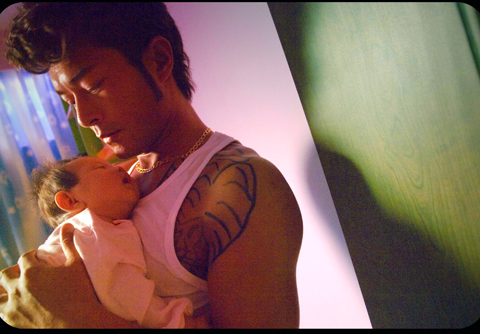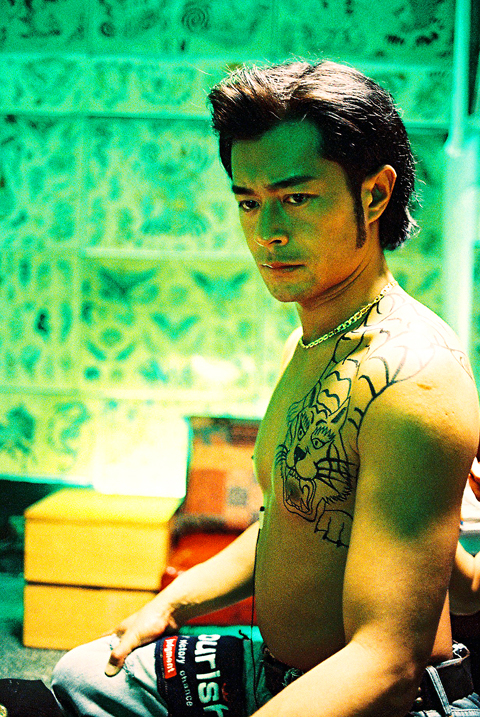An enduring staple of Hong Kong cinema, the testosterone-charged gangster flick has inspired distinctive styles and narrative forms. Under the guise of a triad movie, Run Papa Run (一個好爸爸) sees veteran Taiwanese actress and director Sylvia Chang’s (張艾嘉) take a womanly look at this male-dominated genre, revealing the tough guy’s rarely seen family side through lighthearted drama and comedy and stars the well-cast Louis Koo (古天樂) and Rene Liu (劉若英).
The film begins with a flashback to triad boss Lee’s (played by Koo) childhood in a crime-ridden neighborhood. Raised by a single mother, Lee was always on the wrong side of the law and rose from street punk to gang leader.
This bad boy meets an angelic lawyer named Mabel (played by Liu). Sparks fly, and Mabel shows up on Lee’s doorstep one day, pregnant, luggage in tow.

PHOTOS: COURTESY OF ARM FILMS
Lee’s life is turned upside down after their baby girl is born. Determined to be a good father, Lee keeps his underworld identity a secret to his daughter, while attempting to make his business legit and retire from the gang.
But things don’t go as smoothly as the Lee family had expected as the father is tapped to become the next kingpin. Lee’s first assignment as the leader is to oversee a drug deal, one that goes unexpectedly wrong.
Entertaining and well-realized, Run Papa Run shows director Chang’s competence in storytelling, with seamless editing punctuated by manga-informed graphics and special effects. As the protagonist passes from one chapter of his life to another, the film undergoes a shift of tone, from whimsical musical scenes in the beginning to a latter half that plays out like a soap opera. The final scene, where a gray-haired Koo prays in a church, however, brings the film’s uneven tone to the fore and leaves audiences hanging.

PHOTOS: COURTESY OF ARM FILMS
Most of the film’s humor comes from Lee’s attempt to maintain his double life as a father and a triad boss and hide his criminal affiliations from his daughter. Cute moments abound both in Lee and Mabel’s romance and between the dad and his baby girl. The stylish cinematography uses a palette of bright and saturated colors, and the story is engaging. Unfortunately, however, it remains true to the stereotypical gender roles of the gangster genre, where men are wild and untamed while the women are virtuous.
Known for his onscreen gangster image, Koo makes a smooth foray into the father role and shows off his comedic talent. One of Chang’s principal actresses, Liu effortlessly tackles the role of devoted wife with fairytale-like innocence.
The rare return of veteran actors to the silver screen further boosts the film’s watchability. The performances by seasoned actress Nora Miao (苗可秀) and accomplished thespians Mok Siu-chung (莫少聰) and Kent Cheng (鄭則仕) delight and conjure up memories of the good old days of Hong Kong cinema.

PHOTOS: COURTESY OF ARM FILMS

The People’s Republic of China (PRC) last week offered us a glimpse of the violence it plans against Taiwan, with two days of blockade drills conducted around the nation and live-fire exercises not far away in the East China Sea. The PRC said it had practiced hitting “simulated targets of key ports and energy facilities.” Taiwan confirmed on Thursday that PRC Coast Guard ships were directed by the its Eastern Theater Command, meaning that they are assumed to be military assets in a confrontation. Because of this, the number of assets available to the PRC navy is far, far bigger

The 1990s were a turbulent time for the Chinese Nationalist Party’s (KMT) patronage factions. For a look at how they formed, check out the March 2 “Deep Dives.” In the boom years of the 1980s and 1990s the factions amassed fortunes from corruption, access to the levers of local government and prime access to property. They also moved into industries like construction and the gravel business, devastating river ecosystems while the governments they controlled looked the other way. By this period, the factions had largely carved out geographical feifdoms in the local jurisdictions the national KMT restrained them to. For example,

The remains of this Japanese-era trail designed to protect the camphor industry make for a scenic day-hike, a fascinating overnight hike or a challenging multi-day adventure Maolin District (茂林) in Kaohsiung is well known for beautiful roadside scenery, waterfalls, the annual butterfly migration and indigenous culture. A lesser known but worthwhile destination here lies along the very top of the valley: the Liugui Security Path (六龜警備道). This relic of the Japanese era once isolated the Maolin valley from the outside world but now serves to draw tourists in. The path originally ran for about 50km, but not all of this trail is still easily walkable. The nicest section for a simple day hike is the heavily trafficked southern section above Maolin and Wanshan (萬山) villages. Remains of

Shunxian Temple (順賢宮) is luxurious. Massive, exquisitely ornamented, in pristine condition and yet varnished by the passing of time. General manager Huang Wen-jeng (黃文正) points to a ceiling in a little anteroom: a splendid painting of a tiger stares at us from above. Wherever you walk, his eyes seem riveted on you. “When you pray or when you tribute money, he is still there, looking at you,” he says. But the tiger isn’t threatening — indeed, it’s there to protect locals. Not that they may need it because Neimen District (內門) in Kaohsiung has a martial tradition dating back centuries. On